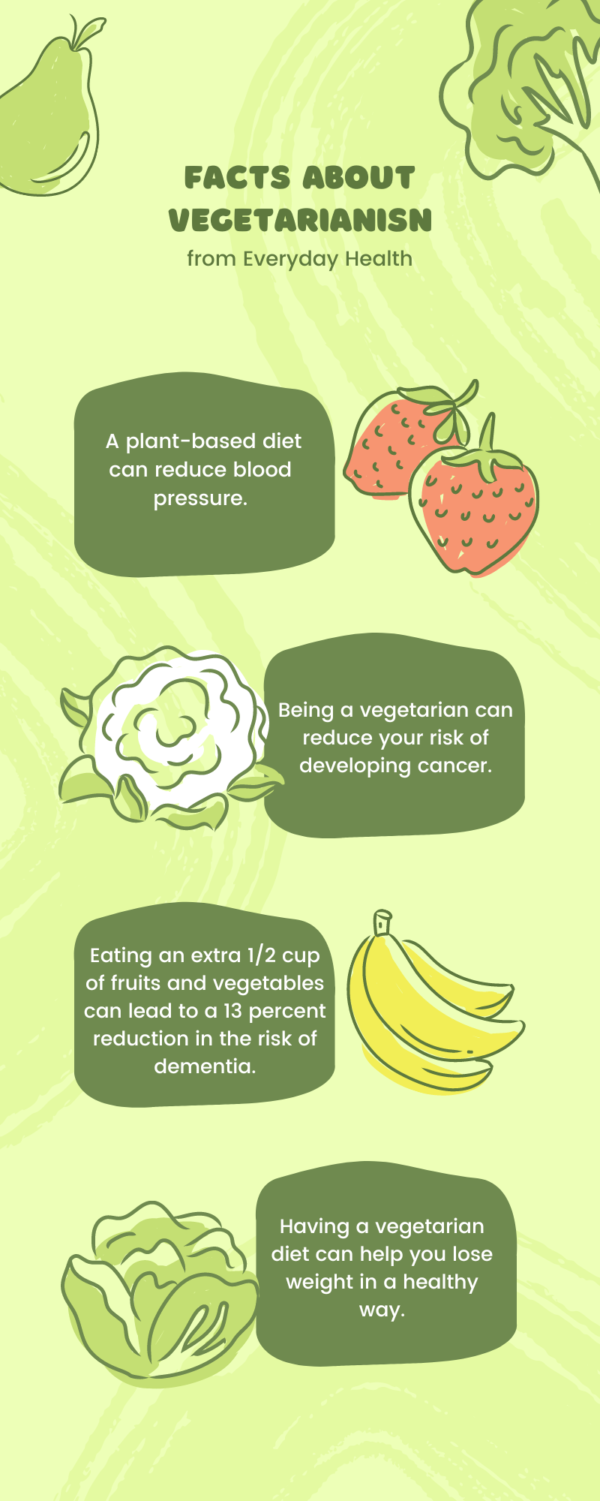5 tips on going vegetarian
A how to guide to make the transition to this healthy lifestyle

If you’re thinking about going vegetarian, you’re not alone. In fact, about 22% of the world, or 1.5 billion people, are vegetarian. Vegetarian is a broad label used to describe someone whose diet does not contain meat or other animal products. Although the term vegetarian covers anyone who does not eat meat, it contains many subcategories.
Pescatarian: a person who does not eat meat but eats fish, dairy products and eggs.
Lacto-Ovo Vegetarian: a person who does not eat meat but eats dairy products and eggs.
Lacto- Vegetarian: a person who does not eat meat but eats dairy products.
Vegan: a person who does not eat any animal products.
There are many reasons for adopting such a lifestyle, including concern for the environment, animals or personal health. Whatever your motivation may be, a transition to a vegetarian diet is not always easy. Here are some tips on going vegetarian!
Do your research
Before starting a vegetarian diet, it is important to do your research. There are many questions to ask, such as: which foods contain meat and animal products? How will becoming vegetarian benefit the environment? How will becoming vegetarian affect me? By finding answers to these questions, you are solidifying your knowledge, as well as giving yourself motivation to pursue this lifestyle. To learn more about vegetarianism, The Vegetarian Society UK and The Vegan Society are both great online resources.
Implement small changes
Completely changing any part of your lifestyle is not an easy task. To ease the transition, implement small changes into your diet at a pace that is comfortable for you. For example, try starting with a vegetarian dinner two nights a week. As you get used to the new diet, increase the number of vegetarian meals you eat. Soon, a vegetarian diet will become your new normal!
Try replacement foods
You may think going vegetarian means changing your diet completely, but there are actually meatless alternatives to many foods. The company Morningstar Farms, for example, produces vegetarian variations of typical meat products, including chicken nuggets, hamburgers and hot dogs. Daiya Foods is a vegan company that provides dairy and meat-free alternatives to popular foods. Trying vegetarian alternatives can be a great way to find out what you enjoy and make the transition easier.
Make sure to get enough nutrients
While vegetarianism is largely considered a healthy lifestyle, there are possibilities for nutrient deficiencies that come with the diet’s omission of meat and animal products. When switching to a vegetarian diet, it is important to make sure that you continue to get the right amount of nutrients, especially protein, vitamin B12, iron and calcium. There are many foods besides meat that contain most of these nutrients, so eating a variety of foods is very crucial. Over-the-counter vitamins and pills, such as iron or vitamin B12 pills, are also available as supplements.
Stay motivated
For most, going vegetarian isn’t easy. While making changes to your lifestyle, it is important to remember why you are doing this. Each person’s motivation may be different, but whatever it is, keep it in mind while you navigate the difficulties. There will be challenges along the way, but it’s worth it in the end!

Hi! I’m Ava, and I’m the Sports Editor for The Journal. Last year, I was a feature writer. While I definitely enjoyed my time there, I’m excited...









